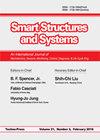An inerter-system chain and energy-based optimal control of adjacent single-degree-of-freedom structures
IF 2.2
3区 工程技术
Q2 ENGINEERING, CIVIL
引用次数: 5
Abstract
Because of the limited land resources and preference of centralized services, more structures are often built close to each other, correspondingly yielding a demand that mitigates the dynamic responses of adjacent structures. Utilizing the intrinsic potential of the inerter to improve structural energy performances, an inerter-system chain is proposed for the adjacent singledegree-of-freedom structures, which forms a novel configuration featuring the reduction in input energy transmitted to the adjacent structures. The inerter-system chain is realized by two end-placed inerter-dashpot dampers and inter-placed springinerter-dashpot elements arranged in parallel. Stochastic energy balance analysis is conducted to derive a closed-form energy equation that reveals the energy basis of the inerter-system chain. An energy-based and bi-objective optimization strategy is developed with simultaneous consideration of displacement and energy performances, particularly easy-to-use design formulae being derived. The findings of this study show that a complete inerter-system chain exhibits a significant multi-reduction in the structural displacement, shear force, and dissipation energy burden. Particularly, the effectiveness of reducing the input power and vibrational energy transmitted into the entire structures counts on the series inerter-chain, which differentiates the proposed chain from alternative layouts. The proposed energy-based design framework is capable of minimizing the energy dissipation cost, with target displacement control demand satisfied.间系统链及基于能量的相邻单自由度结构最优控制
由于有限的土地资源和集中服务的偏好,更多的结构往往建在彼此靠近,相应产生的需求,减轻了相邻结构的动态响应。利用干涉器的内在潜力来提高结构的能量性能,针对相邻的单自由度结构提出了一种干涉系统链,形成了一种新的构型,其特点是传递给相邻结构的输入能量减少。互联系统链由两个端置互联减震器和并联的互联减震器弹簧元件实现。通过随机能量平衡分析,导出了一个封闭形式的能量方程,揭示了系统间链的能量基础。提出了一种基于能量和双目标的优化策略,同时考虑了位移和能量性能,特别是推导了易于使用的设计公式。研究结果表明,一个完整的相互作用体系链对结构位移、剪力和耗散能负担具有显著的多重减小作用。特别是,减少输入功率和传递到整个结构的振动能量的有效性取决于串联互扰链,这将所提出的链与其他布局区分开来。提出的基于能量的设计框架能够在满足目标位移控制需求的情况下使耗能成本最小化。
本文章由计算机程序翻译,如有差异,请以英文原文为准。
求助全文
约1分钟内获得全文
求助全文
来源期刊

Smart Structures and Systems
工程技术-工程:机械
CiteScore
6.50
自引率
8.60%
发文量
0
审稿时长
9 months
期刊介绍:
An International Journal of Mechatronics, Sensors, Monitoring, Control, Diagnosis, and Management airns at providing a major publication channel for researchers in the general area of smart structures and systems. Typical subjects considered by the journal include:
Sensors/Actuators(Materials/devices/ informatics/networking)
Structural Health Monitoring and Control
Diagnosis/Prognosis
Life Cycle Engineering(planning/design/ maintenance/renewal)
and related areas.
 求助内容:
求助内容: 应助结果提醒方式:
应助结果提醒方式:


